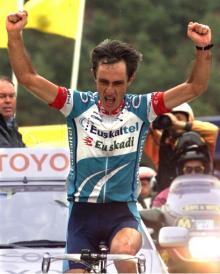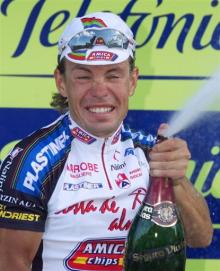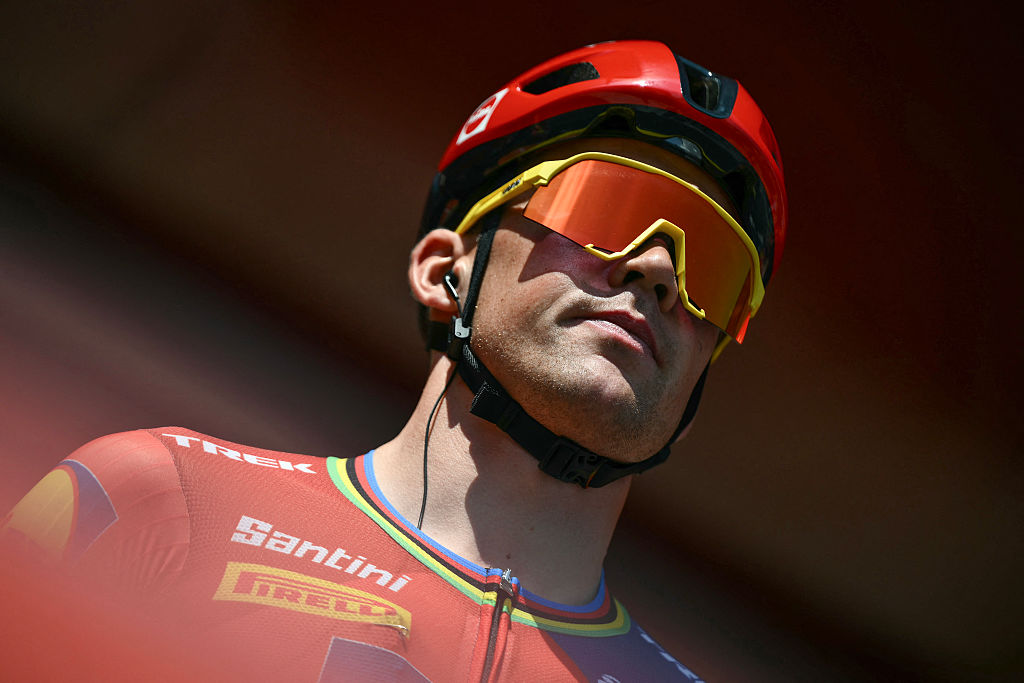A first time for everything: A look back at the '99 Vuelta
Ullrich, Galdeano and Vandenbroucke highlighted a riveting edition of the Vuelta a España
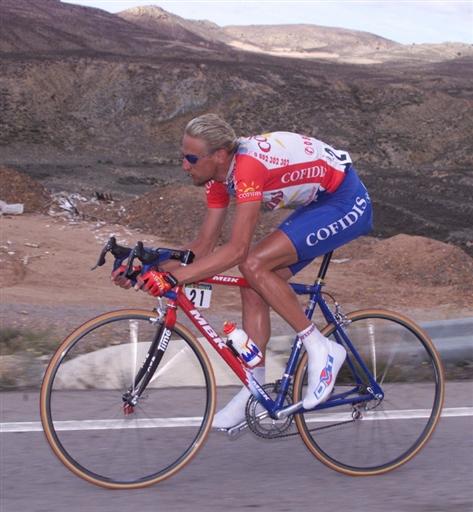
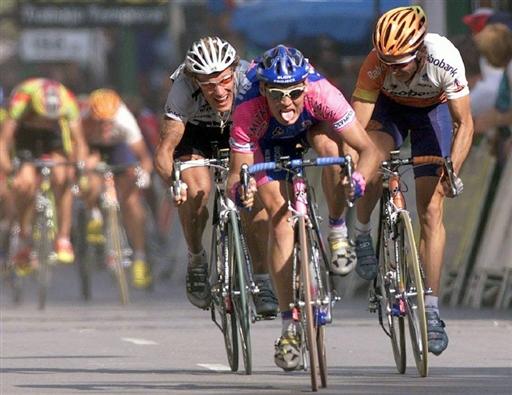
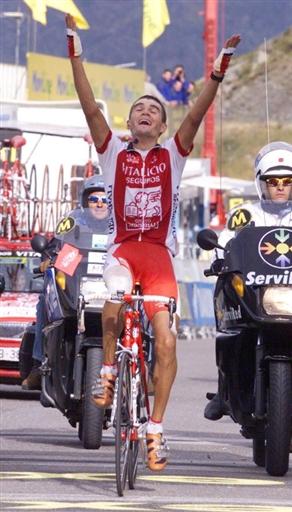
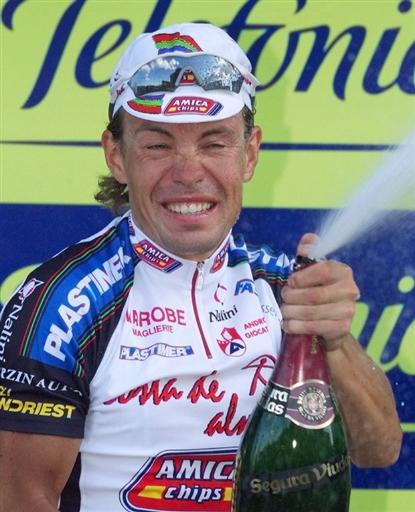
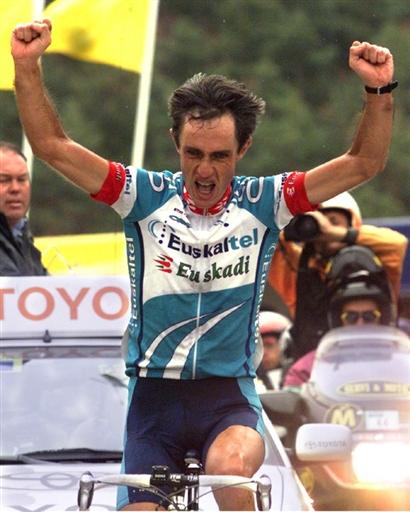
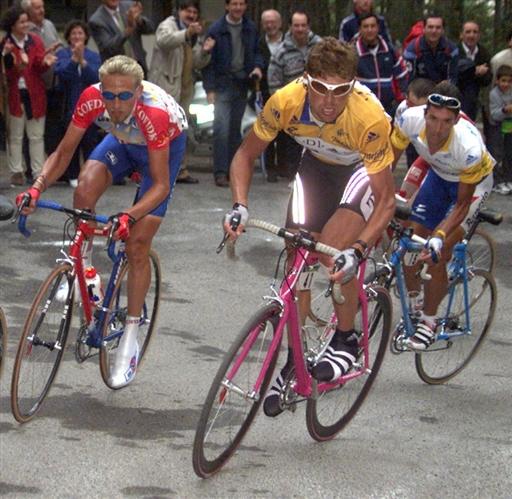
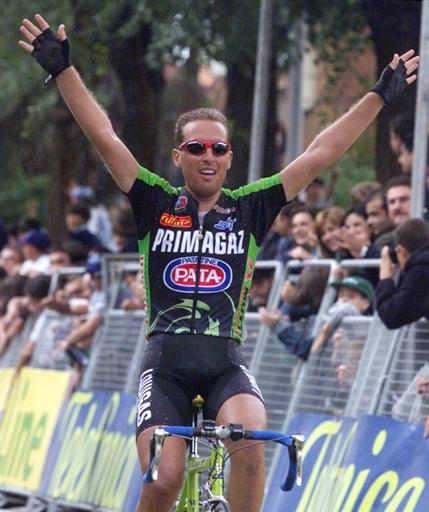
A decade ago, cycling fans were treated to a most intriguing Vuelta a España with a rebounding Jan Ullrich and race revelation Igor González de Galdeano doing battle through to the decisive stage 20 time trial.
While very few of the riders contesting the 1999 Vuelta are back this year, many of the riders who competed 10 years ago set career firsts in that year's Spanish Grand Tour, whether it be an overall victory, stage win in a Grand Tour, or simply the first win of a rider's career.
Enjoy Cyclingnews' look back at several of the '99 Vuelta's protagonists.
Jan Ullrich's first and only Vuelta victory
1997 Tour de France champion Jan Ullrich arrived at the 1999 Vuelta a España on the rebound from a serious knee injury which forced the 25-year-old German to miss the Tour for the first time in four years earlier that summer. Ullrich's expectations for the Vuelta were certainly modest, with his pre-race goals limited to a stage win and the acquisition of form for the Verona, Italy world championships.
Ullrich achieved his stage victory objective relatively early, during the Vuelta's first day in the mountains. The German won a select 23-rider bunch sprint ahead of heavy GC favourite and defending champion, Abraham Olano (ONCE) and Belgium's Frank Vandenbroucke (Cofidis). It marked the first time in Ullrich's professional career that he earned a victory based on his sprinting ability.
Olano would exact his revenge the next day when he convincingly won the stage six time trial, beating Ullrich by 57 seconds and taking a 1:07 lead over the German on general classification. The pundits expected Olano to run away with the Vuelta with his ability to climb with the best, out-time trial everyone in the field and his powerhouse team. However, the epic eighth stage to the Alto de el Angliru summit would sow the seeds of Olano's and ONCE's downfall.
The latest race content, interviews, features, reviews and expert buying guides, direct to your inbox!
Olano crashed on the stage, cracking a rib, and he was ultimately forced to withdraw after stage 13, but Ullrich had already assumed the race lead from Olano the previous day when the Spaniard faltered and finished the day 8:24 off the pace and dropped to ninth on GC.
Instread, Ullrich's main foil turned out to be race revelation Igor Gonzalez Galdeano of the Vitalicio Seguros team. For the rest of the Vuelta, Ullrich endured the Spaniard's onslaught in the mountains and watched his lead slip from 49 to 31 seconds ahead of the penultimate time trial. The Deutsche Telekom team didn't send a squad to the Vuelta with the intention of defending a race lead, and Ullrich was forced to fend for himself in the high mountains against Spanish climbers who were determined to win their home tour.
Ullrich found an ally in Belgium's Frank Vandenbroucke on the final tough day in the mountains, stage 18, as Banesto and other Spanish teams tried to unseat Ullrich. The German found himself in trouble early on the climb to the summit finish, but dug deep to finish in eighth place and retain a 31-second lead over González de Galdeano.
The penultimate time trial would be a masterpiece by Ullrich as he steamrolled Galdeano by 3:44, taking an unassailable 4:15 lead into the Vuelta finale in Madrid. Many Grand Tour triumphs would be predicted for Ullrich in the future based on is comeback performance in Spain. The 1999 Vuelta, however, would be the last time he ever set foot on the top step of a Grand Tour podium again.
Ullrich managed to parlay his good form into a time trial world championship several weeks later in Verona, followed by an eighth place finish in the road race.
Igor González de Galdeano makes a name for himself
The 25-year-old González de Galdeano would prove to be the revelation of the 1999 Vuelta as he jumped into second place on GC following a solo victory on stage 12's summit finish.
The Spaniard, now second to Ullrich by 36 seconds, would remain in second place for the remainder of the Vuelta despite his best efforts to find a chink in the German's armor on the high mountain stages.
González de Galdeano, a strong time trialist, still held out hope that he could surpass Ullrich on the penultimate stage's 46km time trial as he trailed the German by only 31 seconds overall. Ullrich, however, crushed González de Galdeano's hopes with a domineering effort.
The Spaniard's final second place general classification position would be the only Grand Tour podium finish of González de Galdeano's career.
Frank Vandenbroucke
After having a spring to remember in 1999 with wins at Liège-Bastogne-Liège, Het Volk and a stage win at Paris-Nice, Vandenbroucke's drug problems came to light for the first time in his career with an arrest by Paris police. He was cleared of the charges and taken off suspension by his Cofidis team, but he arrived at the start of the Vuelta a true enigma, and it was expected he would not race more than a couple of days before retiring.
Vandenbroucke, however, in his solitary Grand Tour performance, rode into form and became the dominant rider of the final week despite having only one teammate left in the race. The then-24-year-old Belgian won his only career Grand Tour stages, claiming victory in the mountainous 16th and 19th stages.
Vandenbroucke also finished a close second to climbing specialist Roberto Laiseka on stage 18's summit finish and notched a third place finish in the penultimate stage time trial behind powerhouse chrono men Jan Ullrich and Alex Zülle.
Belying his strength in the Vuelta's final week, Vandenbroucke rocketed up the points competition standings and snatched the classification away from South Africa's Robbie Hunter during the final stage in Madrid. Vandenbroucke wore the jersey for the only time of the race and career while on the Madrid podium at the Vuelta's conclusion.
Vandenbroucke would take his superb form to the world road championships in Verona, Italy several weeks later, where he finished seventh while racing with two broken wrists suffered during the event.
Alto de el Angliru
The 1999 Vuelta marked the first time the epic 12.5km Alto de el Angliru was used for a stage finish. The summit, in Spain's northern Asturias region, was used for the end of the 176km eighth stage.
Befitting its fearsome reputation, many pros on the start line that day had installed triple cranksets or mountain bike cassettes on their bicycles in order to provide relief for the climb's steep pitches. The average gradient is 9.6%, with the first 5 kms at 8% and then 5 kms at 12%. From km 10-11 it was feared that many riders would be forced to walk pitches that kicked up to a maximum 23.6%.
Feared in the best of weather conditions, Mother Nature cruelly provided further misery to the peloton's suffering by throwing cold rain and thick fog at the riders on the ascent and throughout the entire stage as well. Approximately 90 of the peloton's 171 riders crashed during the stage, primarily on the treacherous descents of the two first category climbs preceding the Angliru: the Cobertoria and the Cordal.
Only six riders arrived at the base of the Angliru in the lead group: Pavel Tonkov (Mapei) Jan Ullrich and Giuseppe Guerini (Telekom), Roberto Heras and José Luis Rubiera (Kelme) and José Maria Jimenez (Banesto). Tonkov attacked immediately and rode alone until only one kilometre remained, where he was joined by Spanish climbing ace Jimenez.
In a somewhat chaotic finish, Jimenez outsprinted Tonkov for the win amidst a bevy of race motorcycles which had no means of egress from the action approaching the finish line.
In the end, none of the riders had to walk up the Angliru, but the estimated 120,000 soaked fans gathered along its ascent were treated to a true spectacle of suffering as each of the riders clawed his way up to the summit.
Chann McRae
In his first of two years riding for Italian powerhouse Mapei, the 1999 Vuelta a España would be the 27-year-old American's first Spanish Grand Tour experience and McRae passed the test with flying colors. Riding in support of Mapei's general classification challenger, Russian Pavel Tonkov, McRae still managed to finish 19th overall on GC, one of only four non-Spanish riders to crack the top 20 overall.
McRae's best stage finish would be in the 51-kilometre stage six time trial where the American stopped the clock in fifth place, 2:40 behind stage winner Abraham Olano but 1:15 faster than teammate Tonkov. Mapei did not expect such a performance from McRae as he tackled the time trial alone without the benefit of a follow vehicle to supply split times or assistance in case of a mechanical.
McRae would be in the hot seat until Angel Casero, starting seventh from last, bested the American's time by 23 seconds. The result put McRae into fifth on general classification and he would be Mapei's highest placed GC rider until Pavel Tonkov came to the fore on stage eight's dramatic visit to the Alto de Anglirú summit finish.
The American continued his run of good form at the 1999 world road championships where he finished a career-best fifth place, finishing in an elite group of eight riders four seconds behind surprise winner Oscar Freire.
Roberto Laiseka
Marcel Wüst
The German sprinter of team Lotus-Festina owned the first week of the Vuelta, winning four of the first eight stages and wearing the leader's jersey at a Grand Tour for the first time in his career. Wüst even managed to take his third victory while wearing the leader's jersey, definitely a high-point of the German's palmares.
Wüst wrote a daily "Pain and Suffering" diary for Cyclingnews about his Vuelta experiences before retiring from the race after the 17th stage.
Roberto Heras
Spanish climber Roberto Heras set foot on a Grand Tour podium for the first time in his career, fending off Russia's Pavel Tonkov to claim third overall at the Vuelta's conclusion in Madrid. The 25-year-old Kelme rider didn't win any stages, but managed to crack the top three on three separate occasions with his best result being a second place finish to Igor Gonzalez Galdeano on stage 12's HC summit finish at Arcalis.
Robbie Hunter
The 22-year-old South African, a neo-pro in 1999, earned his first career victory as a professional in fabulous style by taking the stage one bunch sprint in Benidorm. The Lampre rider beat Ukrainian Sergueï Outschakov and Australian Robbie McEwen to the line in a crash-marred finale.
Not only did Hunter earn his first Grand Tour victory in the '99 Vuelta, but he claimed the sprints classification as well. Hunter nearly earned the points jersey too, but finished six points shy of surprise points competition winner Frank Vandenbroucke.
Viatcheslav Ekimov
Ekimov bested American Frankie Andreu (US Postal Service) and Paolo Bettini (Mapei) at the finish line after a last kilometre attack by Euskaltel-Euskadi's Igor Flores Galarza was neutralized with 500 metres remaining.
Jacky Durand
The ever clever Durand scooped up enough time bonuses during a two-man escape in the opening stage that he earned the first Vuelta a España leader's jersey of his career at the conclusion of stage one.
Durand and Spaniard Cesar Garcia Calvo built up a lead in excess of 12 minutes, but after being caught inside of 30 kilometres to go Durand managed to finish in the field and take over race leadership by two seconds from prologue winner Igor González de Galdeano.
Cristian Moreni
The 26-year-old Italian earned his first-ever professional victory when he bested his nine breakaway companions into Guadalajara during stage 17. Moreni's victory was also the first Grand Tour victory for his Liquigas team, then a Division II squad in its first year of existence.
Based in the southeastern United States, Peter produces race coverage for all disciplines, edits news and writes features. The New Jersey native has 30 years of road racing and cyclo-cross experience, starting in the early 1980s as a Junior in the days of toe clips and leather hairnets. Over the years he's had the good fortune to race throughout the United States and has competed in national championships for both road and 'cross in the Junior and Masters categories. The passion for cycling started young, as before he switched to the road Peter's mission in life was catching big air on his BMX bike.
